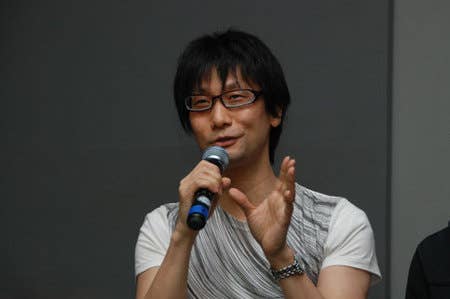Kojima: Japanese games behind in "technology, gameplay and world view"
MGS Creator believes that domestic industry must embrace global outlook to flourish
Hideo Kojima has expressed his concern over the current state of Japanese development once more, telling press that studios in his homeland are lagging in three key areas: technology, gameplay and world view.
Speaking to Eurogamer at a roundtable event at GDC, Kojima claimed that Japanese developers are too introspective, focusing on the niche needs of domestic audiences instead of making games for global audiences.
"I think the problem really is more about where people are looking and who they're targeting," responded Kojima when asked about the public mauling which the Japanese industry had received during the event, most notably from Keiji Inafune and Phil Fish.
Kojima identified technology, gameplay and world view as areas which are vital to creating a global hit, before explaining that Japan is struggling in each.
"A lot of creators are just focused on Japan and the Japanese market and aren't really aware of what people around the world want..."Regarding technology, I think in Japan there are less people going abroad, and maybe less people going to, say, M.I.T. and being at the cutting edge of things. From a technology standpoint, I think Japan is lagging behind a bit.
"I don't want to break this down to a thing where it's Japanese games versus non Japanese games. The key is it has to be a global game, it has to be something made for everybody. I want to get rid of all those barriers."
Nonetheless, says Kojima, the problem of technological education is easily dealt with. It's the other issues which pose more of an obstacle.
"The bigger problem is how do you use that technology to create something? When it comes to gameplay, unfortunately a lot of Japanese creators don't really like creating a free experience. Those types of games aren't being made in Japan.
"Regarding world view, game creators now are creating games based on the culture they know, targeted at Japan and Japanese cultures. So they set it in places like Shibuya or Shinjuku or somewhere else in Tokyo. And it's not something that appeals to people outside of Japan.
"Because Japan doesn't look outside of it's borders then technologies don't come, creating this vicious cycle."
For Western developers, says Kojima, a broad remit ensures that games have a much wider appeal.
"In contrast to that, most Western studios approach things from more of a Hollywood standpoint where they're looking at making their games a very global success and looking at how they can sell them in various markets.
"From the very beginning they have those goals and are able to get the proper budget and commit the proper technology to it."
For the Metal Gear Solid creator, however, it's not a case of making Japanese games great in isolation again. Instead, he sees the right path as being culturally agnostic, blending global approaches by maximising the diversity of methods with which a team works.
"I think that it's still not over. Japan does have the ability to recover from this and get back up to a competitive level, technologically and in other ways.
"I don't want to break this down to a thing where it's Japanese games versus non Japanese games. The key is it has to be a global game, it has to be something made for everybody. I want to get rid of all those barriers.
"You can tell from my generation that I've been influenced by Star Trek, so when I think of my studio I think it as the Starship Enterprise. The Enterprise had people from all races - even Vulcans! I want my studio to be like that.
"This is my Enterprise. It just happens that the captain is Japanese and the ship was manufactured by Konami, but it's a multi-cultural staff."

